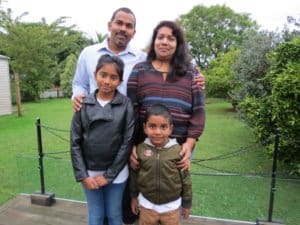 The Peter Family: Shajimon and Maria with their children Sreesha and Shalwin
The Peter Family: Shajimon and Maria with their children Sreesha and Shalwin
One of EIT’s Tairawhiti’s most highly qualified lecturers started his own journey towards knowledge after failing to make the grade at school.
Shajimon Peter began his life in poverty in southern India.
Although his parents did not have much education, they laboured from dawn to dark so their five children could go to school.
But “Shaji” did not really value the opportunity until he ended his schooling by failing. It dawned on him that without education, he had nothing.
He joined his father in the fields, helping him tap rubber trees and
eventually got a job working for a local mason who took him on as a labourer but paid him as a boy. He saved every cent until he had money and could start studying. With help from his brother, and by working at every weekend and holiday, he began studying political science.
The days were long – he had to take three buses to get from his village to the college, leaving home by 6.30am and returning in the evening.
He spent every spare moment reading in the library and by the end of the year, he topped the class.
“I started dreaming bigger,” he said.
He wanted to learn English, and tried to read English newspapers in the library, but it wasn’t until he started comparing articles with similar ones in Indian newspapers that he started isolating words.
“I collected two words every day,” he said.
He drew them into a notebook, using colours and illustrations to remember their meanings.
“By the end of the month I had 60 words.”
By the end of the year he was starting to understand English.
He did his Masters degree in Social Work at Sussex University in England. Again he excelled, winning the John Simmonds Award for Outstanding Achievement.
“I then returned to India and worked for Caritas India – a social development organisation of the Catholic Church – as their regional development officer in Bihar.”
While working with Caritas, Shaji got married to Maria, who had a diploma in nursing.
In 2008, he received a research scholarship from the Newcastle University in Australia to pursue a PhD, studying how ‘Values Education’ perspectives could be used in the non-formal education of children in India to make it more effective for the children. He completed this inter-disciplinary study in 2012 and was awarded his doctorate in March 2013.
He returned to India to teach social work students at the Mahatma Ghandi University in Kerala.
As a student social worker in England, he had experienced the difficulties, both cultural and professional, of transition for people from overseas.
“I wanted to examine the systems and structures that facilitated that transition.”
He decided to study the issue as the subject of a PhD in social work. He was put in touch with Professor Liz Beddoe, at Auckland University, an expert in that field. Dr Allen Bartley, an expert on migration and Liz Beddoe agreed to supervise him.
“I was very privileged to be recruited as a Research Fellow in the second year of my PhD study at Auckland University. That gave me sufficient funding to pursue my second PhD.”
It was this that brought Shajimon, his wife Maria and their two children, Sreesha, 9, and Shalwin, 4, to New Zealand.
He believes it was his destiny to come to Gisborne, after a friend alerted him about the position as social work lecturer at EIT. . He loves the place, the job, the students and his colleagues.
“We are absolutely enjoying our lives here,” he says.
Maria is doing her degree in nursing at EIT. Sreesha is excelling at her new school and Shalwin is loving EIT’s early learning centre. Meanwhile, Shaji is still working on his second doctorate.
He says the doctorate is a journey.
“It’s the process I enjoy. I tell my students that if they persevere there will be a light at the end of the tunnel.
“Oceans are formed by drops of water, mansions are built one brick at a time and great books are written letter by letter. We can achieve the impossible by making some progress every day. “
